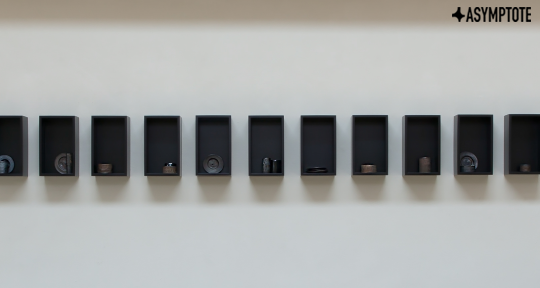In this week of updates on world literature, our Editors-at-Large bring news on an upcoming film adaptation of Władysław Reymont’s The Peasants, a monthly calendar highlighting African writers and literatures, and the most recent winner of the esteemed Golden Wreath in North Macedonia! From Asymptote contributors’ recent accolades to a brief look into Vlada Urošević’s poetry, read on to learn more!
Julia Sherwood, Editor-at-Large, reporting on Poland
A film version of the modern Polish classic, The Peasants by Nobel-prize winning author Władysław Reymont, will hopefully hit the screens later this year, following a lengthy delay caused by COVID and the war in Ukraine. Those familiar with the Gdańsk-based filmmakers Dorota Kobiela and Hugh Welchman will know that this won’t be your run-of-the-mill costume drama; the film uses the same painstaking hand-painted technique that the team pioneered in their earlier acclaimed short film Loving Vincent. Originally scheduled for release in 2022, the production of The Peasants came to a standstill, as twenty-three of the artists working on the film were Ukrainian and based in a studio in Kyiv. Interestingly, it is the film that we have to thank for the new English edition of The Peasants; since the existing translation published in 1924 was rather outdated, Welchman commissioned Anna Zaranko, winner of the 2020 Found in Translation Prize, to translate a couple of chapters for him and subsequently managed to persuade Penguin Classics to publish the complete novel, which is nearly 1000 pages long.
In 2021, one year after Zaranko won it, the Found In Translation Award went to Ewa Małachowska-Pasek and Megan Thomas for their new English version of Tadeusz Dołęga-Mostowicz’s 1932 satirical novel The Career of Nicodemus Dyzma. They discuss the novel with Daniel Goldfarb in the first episode of his series of Encounters with Polish Literature. Now in its third year, this consistently illuminating series of monthly videos that Goldfarb has been producing for the Polish Institute in New York has clocked up twenty-six episodes so far. In Episode 2, which focuses on Andrzej Sapkowski, Goldfarb is joined by David French, who has translated six out of the fantasy writer’s eight novels in the Witcher series into English, as well as all three parts of his Hussite Trilogy. In the most recent Episode 3, Goldfarb and the scholar and translator Benjamin Paloff introduce Leopold Tyrmand, author of one of the great Warsaw novels and popularizer of jazz in mid-twentieth-century Poland, a transformative figure in Polish culture between the death of Joseph Stalin and the post-Stalin thaw.
There have been nominations and prizes galore for Asymptote contributors: Marta Dziurosz has won the First Translation Prize of the UK Society of Authors 2022 for her ‘truly astounding translation’ from the Polish of Marcin Wicha’s Things I didn’t Throw Out, sharing the prize with editors Željka Marošević and Sophie Missing. Mikołaj Grynberg’s heartbreaking collection of short stories, I’d Like To Say Sorry But There’s No One To Say Sorry To, translated by Sean Gasper Bye, has been named a finalist of the Sami Rohr Prize for Jewish literature (the winner to be announced on September 12). Olga Tokarczuk’s monumental The Books of Jacob in Jennifer Croft’s translation finds itself on the shortlist of the 2023 European Bank for Reconstruction and Development Literary Prize alongside fellow Polish author Maciej Hen and Anna Blasiak, translator of his book According to Her (see interview).
And finally, if you are a writer or translator with at least one published book, are currently working on a writing project, are interested in learning more about the Polish literary community, and have a connection with any UNESCO City of Literature outside of Poland, don’t miss the opportunity to apply for a two-month literary residency in Kraków (July 1 to August 31, 2023). The deadline for applications is April 23.






